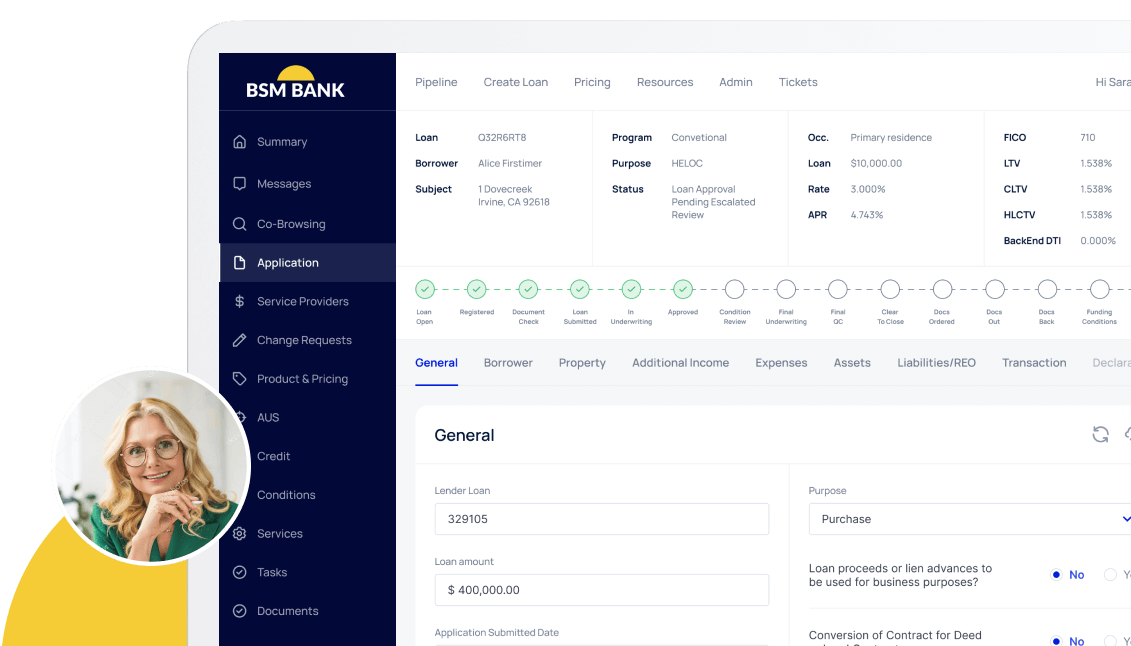Imagine a bustling mortgage lender’s office, where loan officers juggle heaps of paperwork while trying to keep up with ever-changing regulations. Errors are inevitable, leading to delayed approvals and frustrated customers. Consider an alternative scenario where repetitive tasks are automated, data is instantly accessible, and loan officers can focus on strategic decision-making. This is the reality that automated underwriting (AUS) offers.
A study by Bain & Company and SAP found that only 7% of banks can handle loan products digitally from end to end. The mortgage industry is paradigm-shifting, and automation is at the forefront of this transformation. This article aims to educate readers about the benefits of having a mortgage point-of-sale (POS) and AUS integration and will also answer what automation’s role is in the mortgage industry and how it impacts the underwriting process.
Automation’s Role in the Mortgage Industry
Automation plays a transformative and pivotal role in the mortgage industry, revolutionizing traditional processes and reshaping the underwriting landscape. At its core, automation in the mortgage sector refers to integrating advanced technologies and digital solutions to streamline various tasks and optimize the underwriting process.
One of the primary roles of automation in the mortgage industry is to streamline and expedite processes that were once manual and time-consuming. Tasks such as data entry, document verification, creditworthiness assessment, and compliance checks can now be automated, significantly reducing the turnaround time for loan approvals. This acceleration in the underwriting process is a game-changer for lenders and borrowers alike, enabling borrowers to secure their dream homes quickly. In contrast, lenders can efficiently manage a higher volume of applications.
Furthermore, automation enhances data accuracy, mitigating the risk of human errors that often plague manual data entry and calculations. By automating data collection and analysis, mortgage lenders can ensure higher precision in their underwriting decisions. This heightened accuracy leads to more reliable assessments of applicants’ creditworthiness, reducing the likelihood of faulty approvals or rejections based on incorrect information.
Automation empowers lenders with valuable data insights and predictive analytics, significantly improving decision-making processes. Leveraging the power of big data and machine learning algorithms, lenders can make well-informed, data-driven decisions. These data insights enable loan officers and underwriters to assess risk more effectively, optimize loan terms, and tailor solutions to individual borrowers’ needs.
Moreover, automation plays a crucial role in ensuring compliance with industry regulations. The mortgage industry is subject to many ever-changing rules and standards, making compliance a complex and vital aspect of underwriting. Automation streamlines the process of staying up-to-date with changing regulatory requirements. Automated monitoring systems can continuously track regulatory updates and adjust internal processes accordingly, reducing non-compliance risk and potential legal issues.

Evaluating the Impact of Automation on the Underwriting Process
The roles of automation in the mortgage industry profoundly impact the underwriting process, revolutionizing how loans are evaluated and approved. These roles, encompassing streamlined operations, enhanced data accuracy, improved decision-making, and ensured compliance, collectively contribute to a more efficient and customer-centric underwriting landscape.
First and foremost, automation’s ability to streamline processes significantly expedites the underwriting timeline. By automating tasks like data entry and document verification, loan applications can be processed much faster. This swift turnaround benefits lenders and borrowers, as borrowers can receive timely approvals, and lenders can handle a higher volume of applications without compromising accuracy.
Subscribe to BeSmartee 's Digital Mortgage Blog to receive:
- Mortgage Industry Insights
- Security & Compliance Updates
- Q&A's Featuring Mortgage & Technology Experts
The enhancement of data accuracy through automation is equally impactful. Automation eliminates the risk of human errors in data entry and calculations. It ensures that underwriters can access reliable and consistent information. This accuracy is essential in making well-informed underwriting decisions, reducing the likelihood of incorrect assessments and potential financial risks.
Moreover, integrating automation provides underwriters valuable data insights and predictive analytics, empowering them to make more informed decisions. By leveraging advanced technologies like big data and machine learning algorithms, underwriters can assess risks more effectively and tailor loan terms to individual borrowers’ unique financial profiles. This data-driven approach enhances underwriting precision and optimizes loan outcomes, benefiting lenders and borrowers.
Automation’s role in ensuring compliance with industry regulations is equally vital. Compliance is a critical aspect of the underwriting process, and automation simplifies the complex task of staying up-to-date with changing regulatory requirements. Automated monitoring systems enable lenders to adapt their internal processes quickly, minimizing the risk of non-compliance and potential legal issues.
Beyond operational efficiency, automation significantly enhances the overall customer experience during underwriting. By automating repetitive tasks, loan officers have more time to focus on building meaningful relationships with borrowers. This personalized attention fosters trust, improves customer satisfaction, and creates a smooth customer experience.

Embracing the Future of Mortgage Underwriting
The benefits of automation in the underwriting process extend to borrowers, loan officers and underwriters transforming how they work and enhancing their overall efficiency and effectiveness.
- Streamlined Workflows: Automation streamlines workflows for loan officers and underwriters, reducing the burden of manual tasks and paperwork. By automating data collection and document verification, loan officers can access all necessary information instantly, enabling them to focus more on strategic decision-making and personalized customer interactions. This efficiency translates into a smoother and more productive underwriting process.
- Faster Decision-Making: With automation handling time-consuming tasks like data entry and analysis, loan officers and underwriters can make faster and more informed decisions. Automated underwriting systems (AUS) can assess an applicant’s creditworthiness within seconds, providing loan officers with critical information to evaluate risk and determine suitable loan terms. The reduced processing time leads to quicker loan approvals, enhancing customer satisfaction and increasing the potential for business growth.
- Enhanced Accuracy and Consistency: Automation ensures higher accuracy and consistency in the underwriting process. Loan officers and underwriters can rely on reliable and standardized information by eliminating the risk of human errors in data entry and calculations. This precision results in more accurate assessments of applicants’ creditworthiness, reducing the likelihood of faulty approvals or rejections based on incorrect information.
- Data-Driven Insights: Automated underwriting systems offer loan officers and underwriters valuable data insights and predictive analytics. By leveraging big data and machine learning algorithms, they gain a deeper understanding of applicants’ financial profiles, enabling them to tailor loan solutions based on individual circumstances. This data-driven approach optimizes loan terms, reduces risks, and enhances profitability for lenders.
- Improved Compliance: Compliance with industry regulations is critical for loan officers and underwriters. Automation supports compliance efforts by continuously monitoring regulatory updates and implementing necessary changes. Automation minimizes the risk of non-compliance and potential legal issues for lenders and borrowers by ensuring adherence to changing rules and standards.
- Focus on Customer Relationships: With routine tasks automated, loan officers have more time and capacity to focus on building strong relationships with borrowers. Personalized interactions allow loan officers to understand borrowers’ unique needs better and offer tailored solutions. This customized attention enhances customer satisfaction and fosters loyalty and repeat business.

Head into the Future of Mortgage Underwriting
Automation has transcended the realm of mere convenience and emerged as a transformative force in the mortgage industry. While automation leads the way, the human touch remains indispensable, ensuring strategic decision-making and personalized service.
As we journey into the future, the mortgage industry must recognize automation as a catalyst for progress. By harnessing its power, lenders can stay ahead of the competition, create a resilient sector, and pave the way for a more efficient and accurate mortgage underwriting landscape. Are you ready to embrace automation in digital mortgage underwriting and shape a brighter future for the industry?
Uncover the potential of automation in your mortgage operations and delve into its transformative impact on your underwriting process and customer satisfaction. Start your automation journey today and stay ahead in the competitive market! What are you waiting for? Leap into the future now with BeSmartee!




